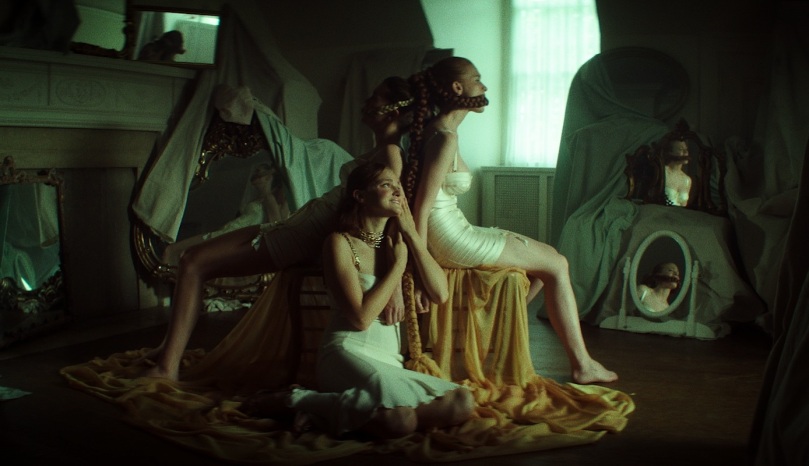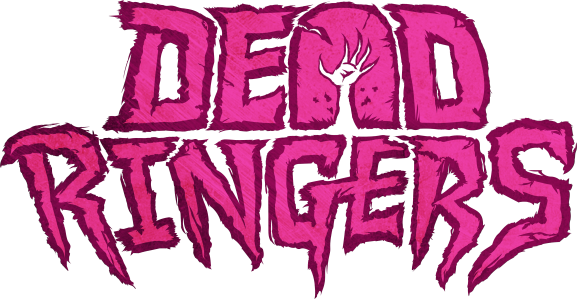By: Paul Farrell

People are puzzles. Riddles. Identities which have to be deconstructed and put back together again as we transition from child to adult; the fractured pieces of our past offering only the vaguest clues as to who we are, instead of the concrete evidence we’d like them to be. These strands, comprised of all we know and have experienced, are then bound together to make a whole that is altogether different than any one of its parts.
Braid, written and directed by Mitzi Peirone, is the story of three women whose lives have been intertwined since youth. Each is afflicted with their own desire for identity and future, an answer to the question of who they are and where it is that they’re meant to be. Set in the decaying mansion of the one who never left the confines of their childhood, Braid finds the three women coming together after a long separation. There they engage in a dangerous game comprised of three unbreakable rules, begetting psychological submission, physical trauma, and a journey which ultimately delves into the darkest recesses of their psyches and their past.
RULE #1: EVERYONE MUST PLAY
The film opens with the three women digging a hole and covered in blood. What they’re burying and why they’re burying it hardly seems important. They’re together, happy, and calm. As they drift to sleep, their feet and legs crossed together over the freshly dug grave, the film transitions.
Petula (Imogen Waterhouse) and Tilda (Sarah Hay) are no longer lying on the grass together with their third counterpart, Daphne (Madeline Brewer), but are instead weighing drugs in a grimy apartment. The fantasy of the prior scene falls away as moments later they’re on the run, desperate to flee the authorities and somehow reclaim the money lost by their seized contraband.
The world around them is harsh and condemning. The color palette fluctuates between black and white and bright over-saturation before transitioning to a cold blue as the story finds Petula and Tilda on a train. Both encounter leering men and uncaring passengers. They’re objectified and taken advantage of. They’re not viewed as equals, rather as objects and, as such, they’re driven toward Daphne. Wealthy, psychologically unstable and reclusive, her hidden riches could offer the escape Petula and Tilda so desperately desire. But to steal from Daphne, to infiltrate her home, they will have to resume a game they have long since left behind.
Dressed in all white garb and resuming their roles in the game, Petula and Tilda return to Daphne’s mansion. Petula is the Doctor, the male authority figure, the one who comes to validate the household. Tilda is the Daughter, the misbehaved youth that needs to be tamed, taught, and trained. Daphne is the Mother, the head of the house and the keeper of the rules. From the moment the three reenter each other’s lives, the game begins. For better or for worse, they are children once more and all that that implies.

RULE #2: NO OUTSIDERS ALLOWED
Once the game begins, the film takes a visual turn stylistically. Hinted at in the opening sequence, colors begin to become more exaggerated as reality turns unreliable. The game offers strict boundaries, confining the women to the house and disconnecting them from others — even their cell phones are to be kept in the mailbox out front. The old, decrepit mansion is decaying around them, paralleling Daphne’s psychological state, something that serves to ignite worry in Petula and Tilda as well. Perhaps they’re not as sane as they thought they were.
The film is an interesting commentary on the idea of what a life is supposed to be. Flashbacks show the viewer moments from the game as they played it as children, revealing the darker edges of its implications even then. Conceptually, it showcases a proposed normality. Not necessarily a perfect one, but one with an order. A mother and her child who needs to see a doctor.
As they’ve aged, the roles have evolved. Now, there is passive aggressiveness behind the Mother’s words. There is sexual tension between the Doctor and the Mother. There is repression and regret, a budding sense of real world problems seeping through the veneer of what was intended to be an innocent game.
The cinematography charts the progression of the characters and their distorted sense of time and place — the camera turning to extreme angles, canted frames, and, at times, flipping vertically and horizontally. Moments of chaos are brought to uncomfortable life by way of the blocking of the scenes and perspective provided to the viewer. Still, the technical presentation feels precise and calculated, allowing the characters’ ever growing crisis of identity and place to feel as visceral as it does emotional.
The horrors presented in the film are incredibly personal ones. While Petula and Tilda fight to reject Daphne and her game, the events and their actions keep drawing them together. Perhaps the answer to their uncertainty lies in their relationships with one another.

RULE #3: NOBODY LEAVES
Throughout its run time, the film cuts back to a dollhouse with a toy train running behind it. Dolls are referenced often as well — Daphne even referring to Petula and Tilda as “my dolls.” Daphne is fond of riddles too. Everything is a game. Everyone is a toy. Controlled and owned. Stagnant and unchanging.
The film is cyclical. A reminder that no matter how far away it is, the past always sits as a foundation to the future. Petula dreams of everything. Tilda wants to belong. Daphne desires a family. Still, dreams are elusive and the outside world is frightening and cruel.
How much easier it is to stay where you’re safe. Controlled. Able to play.
People are puzzles, it’s true. Petula, Tilda, and Daphne amount to a picture that doesn’t work without each of their respective pieces. They are forever bound by what they’ve done, what they want, and what they are. They are woven together, an amalgam of one another, something impossible to see or understand until its deconstructed and braided once more.
Braid offers elegant and grounded performances, cinematography that acts as a beautiful accent to the storytelling, and a fascinating, lyrical script which explores the more complicated elements of identity and purpose. Mitzi Peirone delivers a unique take on the dangers and ideals of youthful imagination, culminating in a coming-of-age story in reverse, wholly uninterested in the real world.
After all, what is youth, but the development of our fantasies. Our dreams. Our games.
Braid plays as part of the Philadelphia Unnamed Film Festival. To purchase tickets or badges, or to find more details about the festival, visit: unnamedfilmfestival.com.
